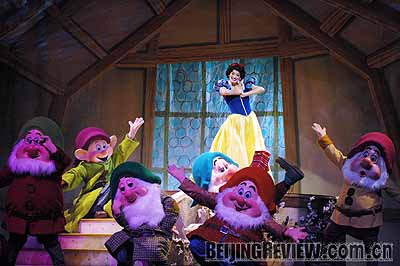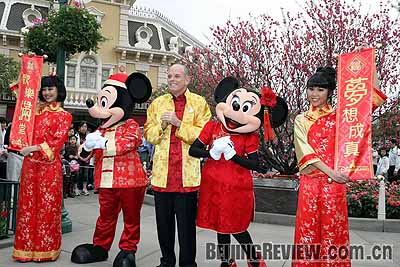|
Shanghai has taken a controversial step toward building Chinese mainland's first Disneyland theme park. On January 17, Mayor Han Zheng said the municipal government had reached an agreement with the Walt Disney Co. to build the park, pending approval by China's State Council.
Han's comments, which confirmed a statement issued by the Walt Disney Co. on January 9, brought the largest cosmopolitan city on the Chinese mainland to the last leg of a decade-long Disneyland journey, which has been both welcomed and attacked by segments of the country.
 |
|
COMING TO CHINA: Snow White, one of the three popular Disney plays produced in the United States specially for the Chinese market, toured the country in July 2008 (MA HAILIN) |
 |
|
LOCALIZED MICKEY: Hong Kong Disneyland, which has received over 15 million tourists, puts on themed activities celebrating China's Spring Festival every year to cater for local tourists (LIU LIANFEN) |
According to a report in the Los Angeles Times, the Walt Disney Co. said in that statement that the company was working with the Shanghai Municipal Government to build a $3.59-billion park to open as early as 2014. It would be Disney's fourth theme park outside the United States, after Paris, Tokyo and Hong Kong. The Los Angeles Times quoted Leslie Goodman, a spokeswoman for the Walt Disney Parks and Resorts, as saying on the same day, "We worked on a joint application report with the Shanghai Government, which will be submitted to the Central Government for review."
A report in The Wall Street Journal revealed details of the final agreement between Shanghai and the Walt Disney Co. The report quoted an anonymous source familiar with the deal that the Walt Disney Co. would take a 43-percent equity stake in the Shanghai Disneyland while a joint-venture holding company owned by Shanghai would hold 57 percent. The source also said the park's first phase, encompassing about 1.5 square km, would include a theme park, a hotel and shopping outlets, and cost up to 24.48 billion yuan, or $3.59 billion.
Best timing
During negotiations with Shanghai over the last decade, the Walt Disney Co. has gained a reputation for being tough, which was underpinned by the unexpected success of the Disneyland in Japan. Amid worries about the Tokyo venture being the first non-American Disneyland, the entertainment giant took no ownership interest in it, opting instead for licensing fees and a percentage of revenues, including 10 percent of admission fees and 5 percent of food and merchandise revenue. However, the Disneyland in Japan, which opened in 1983, proved an incredible success, becoming world's third most visited theme park in 2007 with 13.9 million visitors.
The Walt Disney Co. refused to miss the ownership boat for the Hong Kong Disneyland. In building the 320-acre Hong Kong Disneyland that opened in 2005, the government put up $2.9 billion for the park and related infrastructure development, while the Walt Disney Co. invested a modest $314 million and still walked away with a 43-percent ownership stake.
Although investment shares between Shanghai and the Walt Disney Co. are to be disclosed, different Chinese media quoted anonymous sources as saying that the Walt Disney Co. had "made major concessions" to seal the deal. The catalyst to the deal could be the global economic slowdown. As the Walt Disney Co.'s second-largest business behind media networks, parks and resorts contributed $11.5 billion in sales, or 30 percent of the total, in the fiscal year ending September 27, 2008. Profit from parks and resorts fell to $412 million in the fourth quarter from $430 million a year earlier, although sales at the division rose 6.5 percent to $2.97 billion. In light of the weakening U.S. economy, overseas expansion by seeking the access to the vast Chinese mainland market could be the best strategic choice for Walt Disney.
The Shanghai plan has been viewed optimistically in the Chinese media. A report in Shanghai Securities News on January 12 spoke highly of the economic spillover of the multi-billion-dollar project. The article quoted an anonymous expert from Shanghai as saying that the creation of the Shanghai Disneyland could help generate 1 trillion yuan ($140 billion) in gross domestic product (GDP). He added that more than 80 percent of mainland tourists who visited a Disneyland would go to the Shanghai venue rather than another park. It would unavoidably draw visitors away from the Hong Kong park, which is why the Walt Disney Co. had kept a low profile about its cooperation.
Pot of gold
After Shanghai Securities News quoted unnamed sources on January 8 as saying the Walt Disney Co. had completed talks with the Shanghai Government, the stock price of Waigaoqiao Free Trade Zone Development Co., a Shanghai company whose parent group is likely to take part in building the theme park, surged to its 10-percent limit for four days in a row.
|
